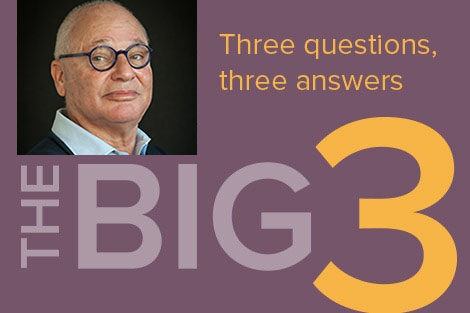December 17, 2020—Jaap Goudsmit, adjunct professor of epidemiology and infectious diseases, is chief scientific officer of the Human Immunomics Initiative, a joint project between Harvard T.H. Chan School of Public Health and the Human Vaccines Project. He is also part of the COVAX Independent Product Group, an effort spearheaded by Gavi, the international public-private partnership focused on vaccines. COVAX is working to steer billions of doses of COVID-19 vaccines to low- and middle-income countries.
As a vaccine expert who has worked in the pharmaceutical industry, what gives you hope right now and what gives you pause with regard to a COVID-19 vaccine?
We are living in history now. The speed with which these vaccines have been developed is an enormous victory for public health. They appear to be safe and they are creating hope, which is very important.
But the way I look at vaccines depends on how well they meet the goal for which they will be used. You want something that will stop the elderly and vulnerable from dying right now, but on the other hand, you want something that will not lose its efficacy in three months. The other element is the vaccine’s utility worldwide. Logistics, distribution, and the cold chain have not yet been worked out and they are not trivial.
The Pfizer vaccine must be stored for the long-term at minus 70 degrees Celsius. That makes it very hard to transport by airplane, because the dry ice it is packed in evaporates and can emit CO2 at unsafe levels. The Moderna vaccine is RNA-based like Pfizer’s, but it can be stored at minus 20. Better, but still a challenge.
There are also many questions still to be answered about how long immunity lasts, and whether the vaccines will protect people from passing on the virus to others.
I believe that a year from now, COVID-19 vaccination will be included among those recommended for people over 60, along with influenza, pneumococcal, shingles, and pertussis. By then, we should know if the RNA-based vaccines protect a year after vaccination, and which vaccine performs best in terms of efficacy, safety, and ease of use. I am looking forward to seeing the results from the one-shot Janssen vector-based vaccine, and the protein-based vaccines from Novavax and Sanofi/GSK, which use well-established vaccine platforms.
What is your perspective on Operation Warp Speed—the public–private partnership initiated by the U.S. government to accelerate COVID-19 vaccine development, manufacture, and distribution?
I think it was the right thing to do. The collaboration between the public domain and the private sector was extremely efficient. I mean, it’s beautiful in my opinion. And of course, this will be debated, but it has proven to work. It also guarantees a diversity of vaccines. The race it spurred between companies has been very productive.
The biopharma industry is often undervalued, but I see these companies as efficient management structures. There are, of course, financial incentives driving their business practices. There is no doubt about that. But the industry has proven this year that it can deliver a public good at an unprecedented speed. And if this effort had been tried solely in the public domain, we would not have accomplished what we have accomplished through Warp Speed.
Now that vaccinations are underway in the U.S., when do you think life will return to something resembling normal?
Vaccines will help us enormously, but we also need to significantly increase testing capacity to fill the gap until enough people are vaccinated. Rapid, at-home antigen testing will help people know if they are infectious and need to stay home. I think certain settings such as sports stadiums or airplanes may need to require testing or proof of vaccination in order to continue to help contain the virus.
I also think that masks and social distancing are likely to be around into 2022. Next year is too early to abandon those measures, in my honest opinion, because this pandemic is so complex.
But the other question is will “normal” life look the same as it did before the pandemic? Will people be more conscious about certain decisions? For example, are we going to fly less? Are we going to work more at home? Will our eating habits change? I expect that life will be different in many ways.
